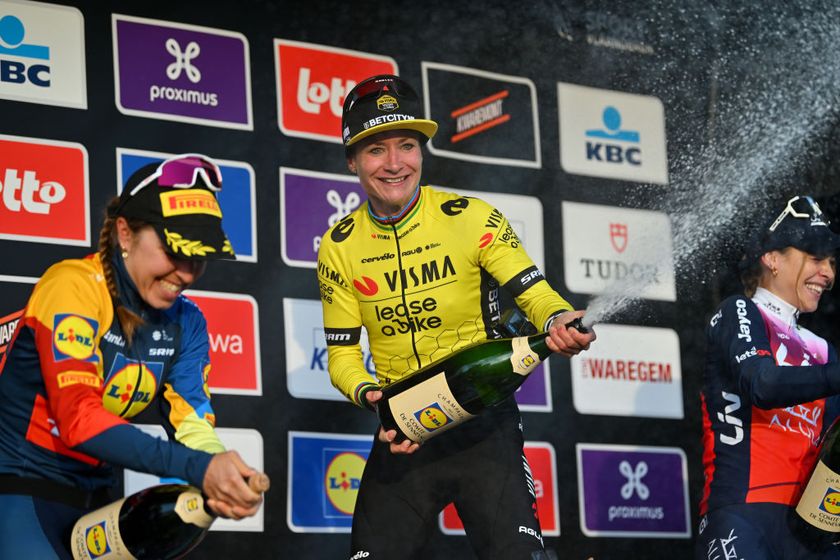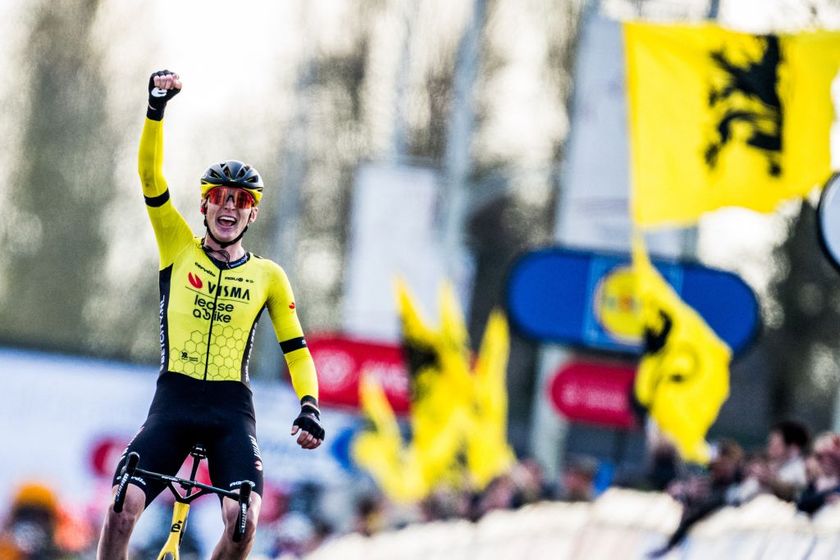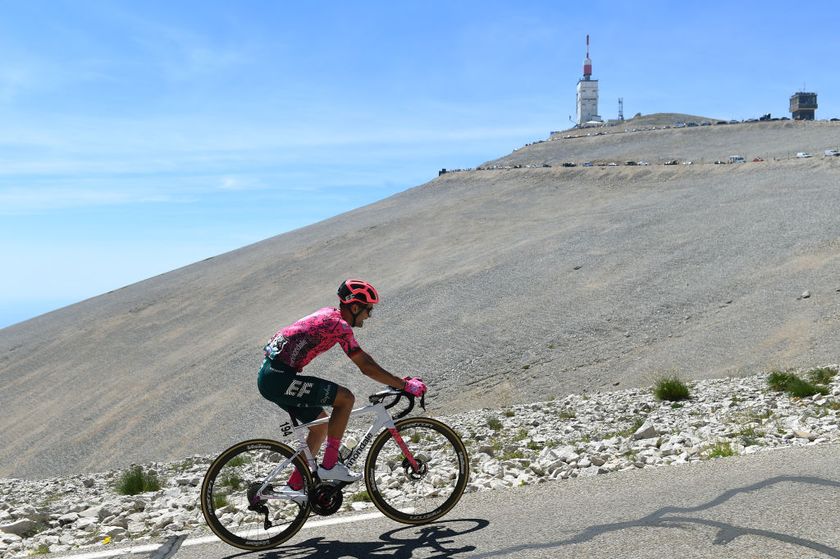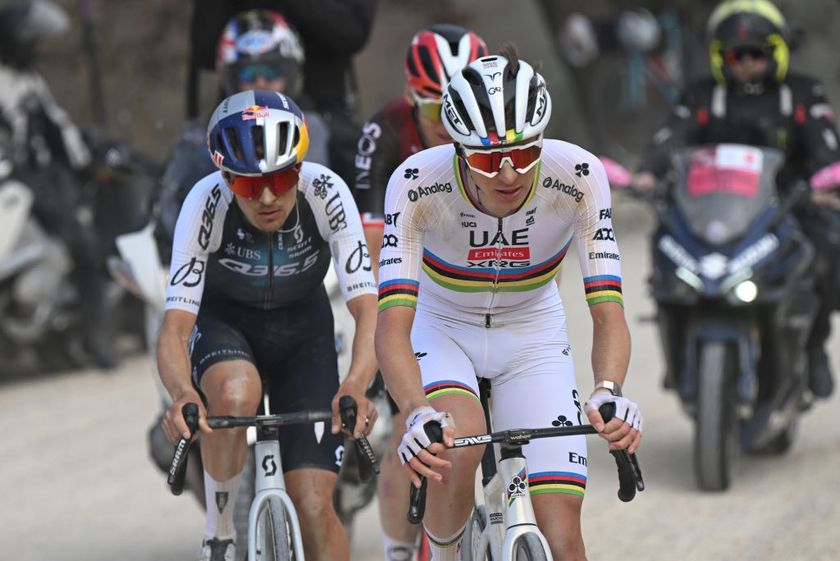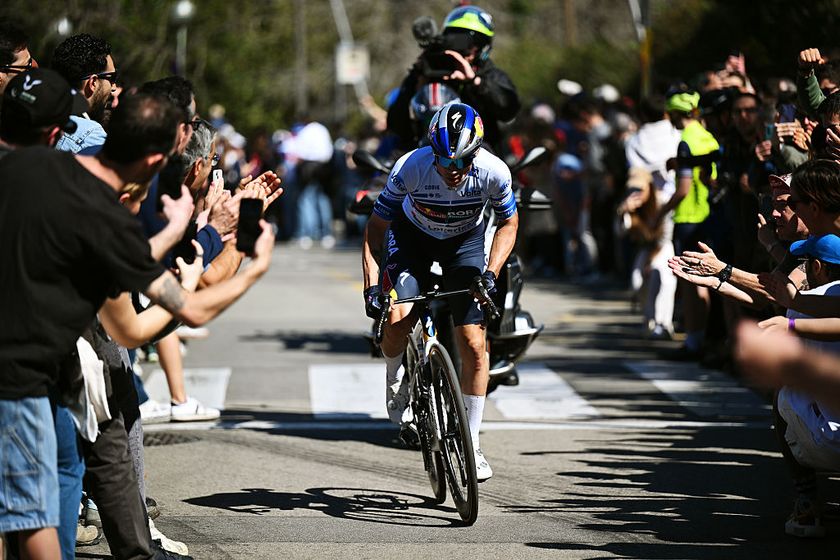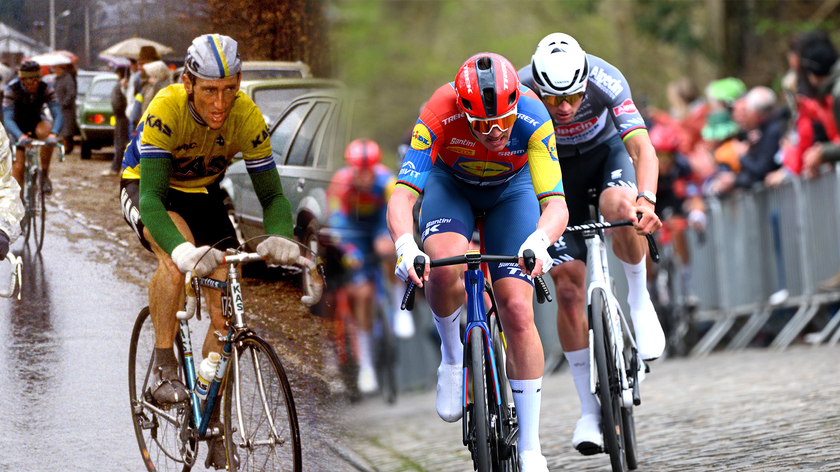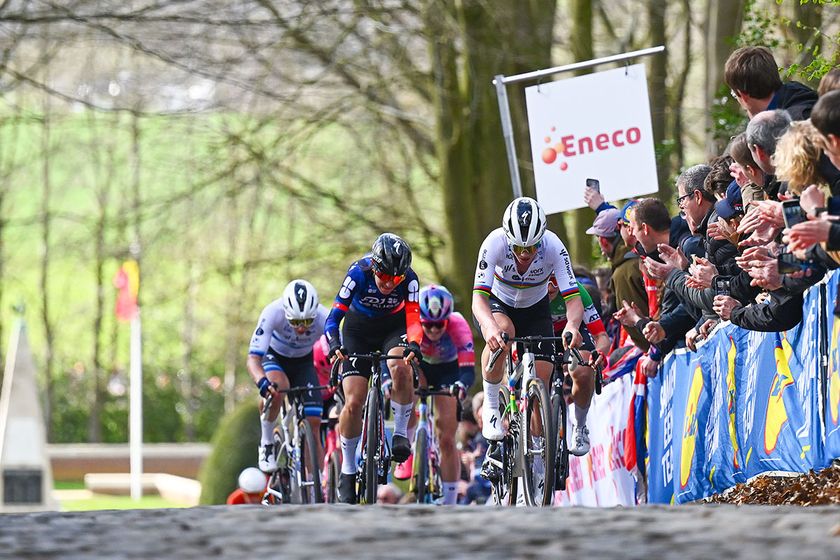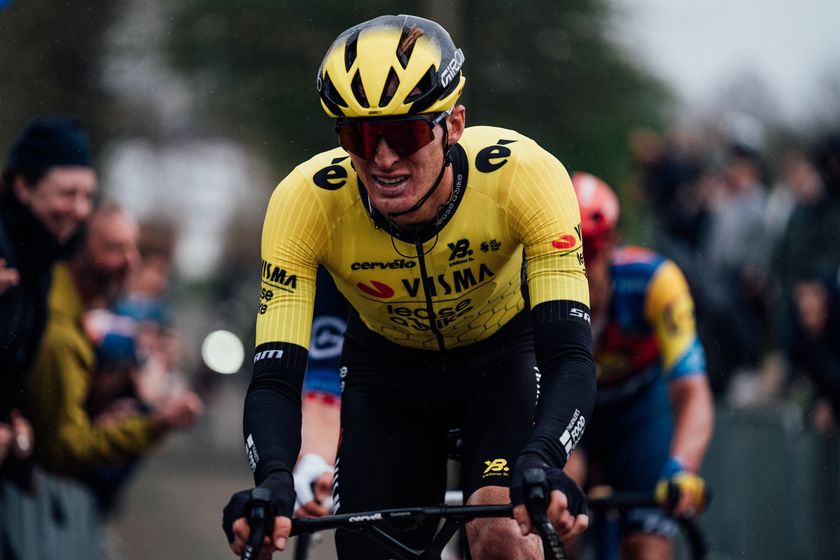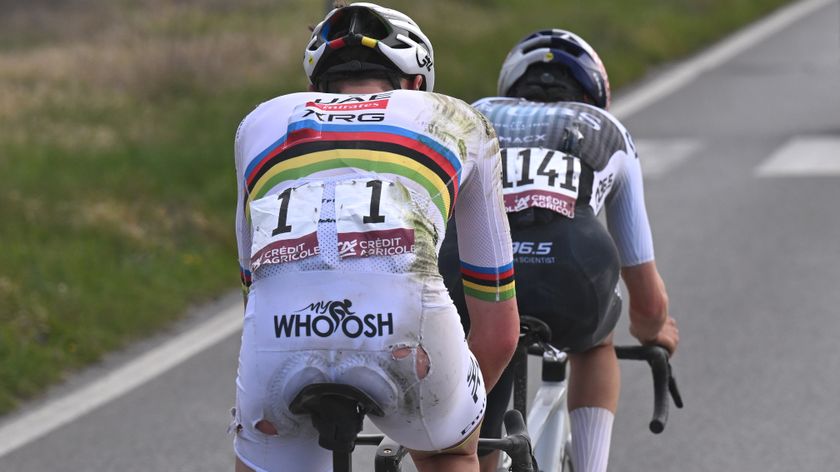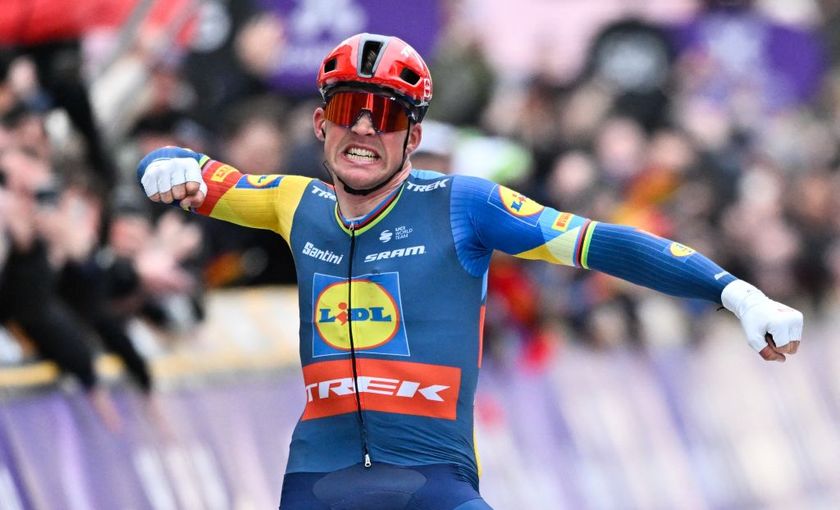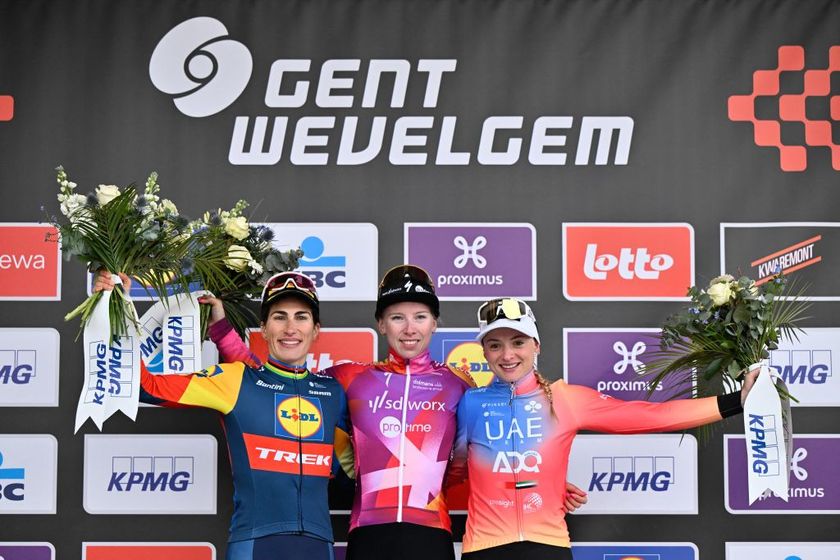Fitness questions and answers for December 5, 2006
Got a question about fitness, training, recovery from injury or a related subject? Drop us a line at...
Form & Fitness Q & A
Got a question about fitness, training, recovery from injury or a related subject? Drop us a line at fitness@cyclingnews.com. Please include as much information about yourself as possible, including your age, sex, and type of racing or riding. Due to the volume of questions we receive, we regret that we are unable to answer them all.
Carrie Cheadle, MA (www.carriecheadle.com) is a Sports Psychology consultant who has dedicated her career to helping athletes of all ages and abilities perform to their potential. Carrie specialises in working with cyclists, in disciplines ranging from track racing to mountain biking. She holds a bachelors degree in Psychology from Sonoma State University as well as a masters degree in Sport Psychology from John F. Kennedy University.
Dave Palese (www.davepalese.com) is a USA Cycling licensed coach and masters' class road racer with 16 years' race experience. He coaches racers and riders of all abilities from his home in southern Maine, USA, where he lives with his wife Sheryl, daughter Molly, and two cats, Miranda and Mu-Mu.
Kelby Bethards, MD received a Bachelor of Science in Electrical Engineering from Iowa State University (1994) before obtaining an M.D. from the University of Iowa College of Medicine in 2000. Has been a racing cyclist 'on and off' for 20 years, and when time allows, he races Cat 3 and 35+. He is a team physician for two local Ft Collins, CO, teams, and currently works Family Practice in multiple settings: rural, urgent care, inpatient and the like.
Fiona Lockhart (www.trainright.com) is a USA Cycling Expert Coach, and holds certifications from USA Weightlifting (Sports Performance Coach), the National Strength and Conditioning Association (Certified Strength and Conditioning Coach), and the National Academy for Sports Nutrition (Primary Sports Nutritionist). She is the Sports Science Editor for Carmichael Training Systems, and has been working in the strength and conditioning and endurance sports fields for over 10 years; she's also a competitive mountain biker.
Eddie Monnier (www.velo-fit.com) is a USA Cycling certified Elite Coach and a Category II racer. He holds undergraduate degrees in anthropology (with departmental honors) and philosophy from Emory University and an MBA from The Wharton School of Business.
Eddie is a proponent of training with power. He coaches cyclists (track, road and mountain bike) of all abilities and with wide ranging goals (with and without power meters). He uses internet tools to coach riders from any geography.
Get The Leadout Newsletter
The latest race content, interviews, features, reviews and expert buying guides, direct to your inbox!
David Fleckenstein, MPT (www.physiopt.com) is a physical therapist practicing in Boise, ID. His clients have included World and U.S. champions, Olympic athletes and numerous professional athletes. He received his B.S. in Biology/Genetics from Penn State and his Master's degree in Physical Therapy from Emory University. He specializes in manual medicine treatment and specific retraining of spine and joint stabilization musculature. He is a former Cat I road racer and Expert mountain biker.
Since 1986 Steve Hogg (www.cyclefitcentre.com) has owned and operated Pedal Pushers, a cycle shop specialising in rider positioning and custom bicycles. In that time he has positioned riders from all cycling disciplines and of all levels of ability with every concievable cycling problem.They include World and National champions at one end of the performance spectrum to amputees and people with disabilities at the other end.
Current riders that Steve has positioned include Davitamon-Lotto's Nick Gates, Discovery's Hayden Roulston, National Road Series champion, Jessica Ridder and National and State Time Trial champion, Peter Milostic.
Pamela Hinton has a bachelor's degree in Molecular Biology and a doctoral degree in Nutritional Sciences, both from the University of Wisconsin-Madison. She did postdoctoral training at Cornell University and is now an assistant professor of Nutritional Sciences at the University of Missouri-Columbia where she studies the effects of iron deficiency on adaptations to endurance training and the consequences of exercise-associated changes in menstrual function on bone health.
Pam was an All-American in track while at the UW. She started cycling competitively in 2003 and is the defending Missouri State Road Champion. Pam writes a nutrition column for Giana Roberge's Team Speed Queen Newsletter.
Dario Fredrick (www.wholeathlete.com) is an exercise physiologist and head coach for Whole Athlete™. He is a former category 1 & semi-pro MTB racer. Dario holds a masters degree in exercise science and a bachelors in sport psychology.
Scott Saifer (www.wenzelcoaching.com) has a Masters Degree in exercise physiology and sports psychology and has personally coached over 300 athletes of all levels in his 10 years of coaching with Wenzel Coaching.
Kendra Wenzel (www.wenzelcoaching.com) is a head coach with Wenzel Coaching with 17 years of racing and coaching experience and is coauthor of the book Bike Racing 101.
Steve Owens (www.coloradopremiertraining.com) is a USA Cycling certified coach, exercise physiologist and owner of Colorado Premier Training. Steve has worked with both the United States Olympic Committee and Guatemalan Olympic Committee as an Exercise Physiologist. He holds a B.S. in Exercise & Sports Science and currently works with multiple national champions, professionals and World Cup level cyclists.
Through his highly customized online training format, Steve and his handpicked team of coaches at Colorado Premier Training work with cyclists and multisport athletes around the world.
Brett Aitken (www.cycle2max.com) is a Sydney Olympic gold medalist. Born in Adelaide, Australia in 1971, Brett got into cycling through the cult sport of cycle speedway before crossing over into road and track racing. Since winning Olympic gold in the Madison with Scott McGrory, Brett has been working on his coaching business and his www.cycle2max.com website.
Richard Stern (www.cyclecoach.com) is Head Coach of Richard Stern Training, a Level 3 Coach with the Association of British Cycling Coaches, a Sports Scientist, and a writer. He has been professionally coaching cyclists and triathletes since 1998 at all levels from professional to recreational. He is a leading expert in coaching with power output and all power meters. Richard has been a competitive cyclist for 20 years
Andy Bloomer (www.cyclecoach.com) is an Associate Coach and sport scientist with Richard Stern Training. He is a member of the Association of British Cycling Coaches (ABCC) and a member of the British Association of Sport and Exercise Sciences (BASES). In his role as Exercise Physiologist at Staffordshire University Sports Performance Centre, he has conducted physiological testing and offered training and coaching advice to athletes from all sports for the past 4 years. Andy has been a competitive cyclist for many years.
Michael Smartt (www.cyclecoach.com) is an Associate Coach with Richard Stern Training. He holds a Masters degree in exercise physiology and is USA Cycling Expert Coach. Michael has been a competitive cyclist for over 10 years and has experience coaching road and off-road cyclists, triathletes and Paralympians.
Kim Morrow (www.elitefitcoach.com) has competed as a Professional Cyclist and Triathlete, is a certified USA Cycling Elite Coach, a 4-time U.S. Masters National Road Race Champion, and a Fitness Professional.
Her coaching group, eliteFITcoach, is based out of the Southeastern United States, although they coach athletes across North America. Kim also owns MyEnduranceCoach.com, a resource for cyclists, multisport athletes & endurance coaches around the globe, specializing in helping cycling and multisport athletes find a coach.
Beating a training parter
Child racing issues
Energy cost of excess body fat
Knee problems after time off
Time trial to road bike fit
Bike posture imbalances
Osteoporosis
Beating a training partner
I'm a male rider 35 years old, 72kg and 169cm tall. I have taken up cycling 5 months ago and was already reasonably fit from running. I have been training with a good mate who has been riding for a lot longer (6 years) and am doing 250 - 300kms per week over a variety of terrain. We both push each other hard on our training rides. My training partner weighs the same and is slightly taller - about 180cm.
When going for a ‘win’ on our rides he always pips me at the post on flat sprints and hill climbs. I know we are both at our limits and that he really is giving it everything, as am I.
My question is - if we are always training together on the same rides how can I improve more than him? Will I need to sneak out after we finish and do more riding behind his back?
I want to beat him - badly and consistently. How can I increase my fitness to overtake him or get the edge? I haven't incorporated weights into my training (neither has he), is this something to explore? Should I drop more weight?
Looking forward to your response so I can kick some ass for a change.
Andrew
Scott Saifer replies:
If you want to beat your buddy on hills, you'll almost certainly have to drop some weight. As a very rough estimate, you have to weight the same as him minus one kilo for each cm that you are shorter than him. This assumes that your fundamental genetic talent is similar.
Richard Stern replies:
As you are both the same mass, you both need to generate the same power to ride side by side (presuming that you have the same aero drag -- which you won't. It's likely your buddy's drag is higher due to him being taller). If your buddy is therefore beating you on the ride, then barring any mechanical differences in bikes (and you'd have to have a wreck of a bike, and your buddy would have to have the best bike, or you use a knobbly tyre MTB and your friend has a nice slick road bike) your friend simply generates more power than you both aerobically (e.g. uphill) or non-aerobically (e.g. sprints).
Child racing issues
I am the father of a keen 8 year-old daughter who participates in a cycling clinic. As well as your excellent answers, postings/sites that are relevant would be great:
How much of one sport is healthy for children up to mid teens? Total sport in a week? Are there absolutes in terms of the age a child specialises?
What are the most important fit issues for children as they are growing? Are there any particulars for track bike fitting?
Andrew Gannon
Scott Saifer replies:
First, pick up a copy of ‘From Childhood to Champion Athlete’ by Tudor Bompa.
Energy cost of excess body fat
Have there been any studies done on the impact that excess body fat has on human performance? I'm not talking about excess weight which can be quantified through physics calculations, I want to know if anyone has studied changes in the efficiency of the human body while performing a given workload at various body fat levels.
How much does fat affect the body’s functioning? Do the fat cells rob the muscles of energy or oxygen while exercising? What other impact might there be?
Thanks
Alex Pond
Scott Saifer replies:
The study you are proposing would be extremely difficult to carry out. Other than by liposuction, how would you have subjects change body fat percentage without changing anything else that would affect efficiency? Why do you want the answer? If you are happy with how fast you ride, maintain your current training and body composition. If you want to climb faster and you have fat to lose, lose it.
Knee problems after time off
I read with great interest the answer given in the ‘knee problems after time off’ question posted on November 22. This seems to be a bit similar to the situation I am in, except my knee problem occurred after three weeks off rather than many months.
I have been riding for 15 years and average around 8,000 - 10,000 miles per year. After the three-week break at the end of the 2006 season I returned to the bike and developed a pain in my right knee. The problem probably developed from doing too much too soon. I took the break not because of any pain or injury but, ironically, to let my body rest and try to prevent any overuse injuries.
Would Mr. Saifer or anyone else on the panel be able to give some general guidelines as to how long to wait before returning to the bike? How does one know how much time to refrain from riding since the knee is not painful off of the bike? What is the general healing time for such a problem? What about walking or other exercises to keep the muscles from becoming any weaker or less supple?
I normally avoid taking anti-inflammatories or other medication, but should I consider it during the healing process or once I begin riding? Are there any supplements I ought to consider or nutritional advice over the next weeks of letting the knee heal?
Thanks for your advice,
Rob Weiss
Scott Saifer replies:
If the knee doesn't hurt off the bike, you are already ready to start riding. However, start with a very short ride at very low intensity.
Time trial to road bike fit
I've been reading your forum, and have picked up a significant amount of information on a number of topics. I do have, what I hope, is a unique question relating to a recent move from a ‘triathlon’ forward position to a conventional road bike.
Are there any common mistakes in positioning that are made with this type of transition? Most articles focus on how to make the move to a steep set up from a more slack position, not the other way around. I have also read there are benefits to training in both positions. Do you find this to be true?
I came to cycling by way of long course triathlon, so I don't have a lot of experience with a conventional bike position. I've purchased a Trek 5.9, and I'm trying to adapt to the new feeling of the slack seat-tube angle. The initial sensation was that of sitting on the back tire, and catching too much wind.
I'm 5'11 165lbs. 35 years old with average ability, and reasonable flexibility. My 30" inseam is very short, so needless to say I have a very long torso. Add to the mix, size 12US feet. (Yes, God must have a sense of humor.) My Litespeed is 57" large by most standards, but given my long upper body, its works. My Trek is a 56" with a 100mm stem, all the spacers removed, no real comfort issues at this point.
Is it logical that I would have the sense my cleats are too far forward on the road bike versus my time-trail bike? Given 5 years on the steep bike ('02 Litespeed Blade), should I try to utilize a slightly forward position on a road bike? I ride with a Powertap, and have found that I can produce more power at a lower perceived effort on the road bike in comparison with the TT bike, but my average speed is down somewhat. How do you best determine a balance between watts and aerodynamics?
Thanks for your time,
Andrew Bowman
Steve Hogg replies:
You describe a fairly common scenario. There can be a couple of problems with the transition you speak of, from a steep seat tube angled triathlon bike to a more relaxed seat tube angled road bike. Generally people making this transition take a while to adapt, sometimes months. Why?
Bike posture imbalances
I have written in to the forum before, but as I'm a little farther along in my quest for a balanced posture on the bike, I'm here with an update.
Short summary to date: 24yr old male, been riding competitively for ~6years. Problems began with knee tendonitis 3+ years ago, progressed to fairly severe back pain this year. My self diagnosis was that I drop my right hip when pedaling under load, left leg pedals smooth- right leg sloppy, right knee locks back further than left when standing up straight, and left hip is higher when standing and looking in the mirror. I am a mechanical engineer, so my job consists of mostly sitting at a desk.
For the past two months I have been seeing a local chiropractor, and have made some improvements. During this time I have kept riding, but with a reduced workload and only low intensities. His diagnosis is that my right hip was twisted (can't remember internal or external), and the angle of the L5 vertebrae was too large (too much arch in lower back). Also, right hamstring is much tighter than left, but no leg length discrepancy (which I had suspected). He also did a muscle strength test, and found that my left leg was weaker in almost every direction of motion (surprising to me), and I have weak hip flexors both sides. His treatment has consisted of several adjustments and recently the prescription of a set of exercises to build strength in the weak areas and lengthen the tight muscles.
My bike is set up now according to Steve Hogg's recommendations for cleats, saddle setback/height, etc. I have two Lemond wedges stacked on each shoe thick side toward ball of foot, which has helped ease my discomfort to some degree since I used to pedal with my knees very close to the top tube. Everything else on the bike is set the same left to right currently. In the past I have tried different shims and footbeds, but none seemed to help. I am reluctant to shim either side now, since my chiropractor has showed me the X-rays which show no noticeable discrepancy.
At this point, I feel that I am making progress to even out the imbalances. The problem is that I feel worse on the bike! I'm not sure if it's a case of it must get worse to get better, and all the compensatory mechanisms must be reduced or eliminated before I can build balanced strength on the bike, I don’t know. My question comes down to this: is there anything that I can do while I receive treatment to ease the discomfort I encounter?
Any help is much appreciated,
Chris Barker
Sacramento, CA
Steve Hogg replies:
A common story. Rider seeks treatment and becomes a better functioning version of who they are but feels worse on the bike. Answer? Positional changes to reflect the structural improvements you have made.
Osteoporosis
I'm a 48yo male cyclist racing A grade with Vets and B grade with the kids. I just went along to have bone densitometry and the result was unexpectedly bad. I ran most nights from 15 to 42 yeas of age and changed to cycling 6 years ago after an Achilles tendon injury that took forever to heal.
My exercise now is exclusively cycling and I'm time poor. Racing on Saturday, long hard ride on Sunday and heavy interval work (5 or 3 minute or 35second intervals) on a wind trainer for about 40 minutes each week night. No other health issues but cramps are bad. I take Magnesium tablets before the weekend rides and they help the cramps. Diet is excellent (except for the highly refined garbage I eat & drink when riding) and I always have lots of dairy products.
So what to do about my osteporotic bones? Calcium/vitamin D supplements? How much? Just before exercise sessions or any time? See and Endocrinologist? What is the most effective weight bearing routine for a time poor cyclist?
I've read Pam Hinton's excellent article on this issue but I don't quite understand her exercise recommendations (‘loading cycles’ and recovery periods between). Can I expect to re-mineralise bone or just slow an inevitable deterioration with age?
I really want to get a program going that will work because I would hate to work hard on my bones and find things were even worse when I go back for another scan in 2 years.
Thanks
David Dickson
Pamela Hinton replies:
I realize that the results of your recent bone density test feel like “bad news”, but it really is better to know your health status, so you can do something about it. It won't help your bone density, but it may benefit your morale to know that you are not the only male cyclist with low bone density.
